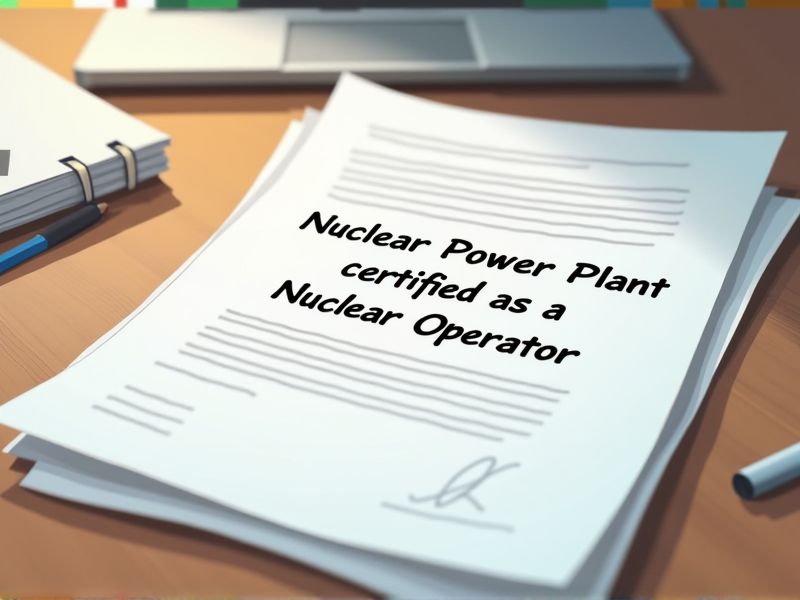
Nuclear power plant operators carry the responsibility of managing the safe and efficient operation of facilities that produce significant energy outputs. The complexity of nuclear reactors necessitates specialized knowledge and adherence to strict safety protocols to prevent hazardous incidents. Certification ensures that operators are well-versed in technical skills and regulatory compliance, equipping them to handle the sophisticated systems within nuclear power plants. Key certifications essential for this role include the Reactor Operator License, Senior Reactor Operator License, and NRC Certification, among others.
NRC Reactor Operator License
The NRC Reactor Operator License is essential because it ensures that operators meet federal standards for safely managing nuclear reactors. This certification verifies that the individual has received extensive training and can respond effectively to potential emergencies. Without it, operators may not possess comprehensive knowledge of regulatory requirements, potentially leading to safety violations. The license also fosters public confidence in the safe operation of nuclear power plants by holding operators accountable to stringent oversight.
NRC Senior Reactor Operator License
A Nuclear Reactor Operator needs an NRC Senior Reactor Operator License because it authorizes them to make critical decisions during reactor operations, especially in emergency situations. Without this license, operators lack the formal validation required to oversee reactor safety and ensure regulatory compliance. The rigorous training and examination process for the NRC license enhances the operator's ability to manage complex nuclear systems effectively. Supervisory roles often necessitate this certification to align operations with federal safety standards and protocols.
Designated Operator Training Certification
Nuclear power plants require precise and safe operation, which is why designated operator training certification ensures that operators are rigorously educated and capable. The rigorous standards for certification help minimize the risk of human error, which can lead to significant safety hazards. Certified Nuclear Operators maintain their competencies through continuous training that aligns with evolving industry regulations and technological advancements. Designated certification also reinforces accountability and standardization among operators, promoting a culture of safety and reliability within the facility.
Radiation Protection Technician Certification
A Radiation Protection Technician Certification is essential because it ensures operators possess the skills to minimize radiation risks, safeguarding both personnel and environment. This certification equips nuclear operators with specialized knowledge in detecting and controlling radiation exposure levels. Understanding regulatory compliance is crucial, and such certification embeds those guidelines into the operator's practice. Certified expertise in radiation protection contributes to a culture of safety and operational efficiency within nuclear power facilities.
Nuclear Emergency Preparedness Certification
Operators of nuclear power plants require Nuclear Emergency Preparedness Certification because it ensures they have the skills to respond effectively to critical incidents. The certification provides them with necessary training to manage emergencies, potentially mitigating the risks of catastrophic failures. Regulatory bodies frequently mandate such certifications to maintain public safety and confidence in nuclear energy. Without this certification, operators might lack the knowledge to correctly handle nuclear incidents, leading to increased risks of accidents.
Nuclear Safety and Risk Management Certification
Nuclear Safety and Risk Management Certification is essential for a Nuclear Power Plant Operator to ensure they possess comprehensive knowledge of safety protocols and risk mitigation strategies, which directly contributes to preventing accidents. This certification ensures compliance with international regulatory standards, enhancing the credibility of the facility's operations. It forms a critical part of a holistic approach in equipping operators to handle unforeseen situations effectively, thereby reducing the likelihood of catastrophic events. Strict adherence to certified safety practices can maintain public trust and facilitate the long-term viability of nuclear energy as a sustainable power source.
Nuclear Fundamentals Training Certification
Nuclear Fundamentals Training Certification provides essential knowledge of nuclear physics and reactor operations, ensuring operators have the theoretical foundation required for safe plant management. Gaining this certification allows operators to comprehend and adhere to critical safety protocols, significantly reducing the risk of accidents. Operators with such training can better identify and respond to abnormal conditions, enhancing the overall reliability of the nuclear facility. The certification process also ensures operators stay updated on evolving regulatory standards and technological advancements relevant to nuclear power operations.
ASME NQA-1 Quality Assurance Certification
ASME NQA-1 Quality Assurance Certification ensures standardized safety protocols, crucial for the reliable operation of nuclear power plants. Achieving this certification demonstrates a strong commitment to maintaining rigorous safety standards, reducing the risks of operational incidents. Certified operators gain a comprehensive understanding of quality assurance practices, vital for meeting regulatory requirements and improving plant efficiency. This certification also enhances industry trust, as it validates the operator's capability to manage complex nuclear systems safely.
Hazardous Materials Handling Certification
Hazardous Materials Handling Certification is essential for Nuclear Operators to ensure safe management and mitigation of risks associated with radioactive substances. This certification equips operators with the expertise to handle materials that are critical to preventing environmental contamination and radiation exposure. Regulatory bodies mandate such certifications to adhere to strict safety standards and protect public health and safety. Proper certification helps maintain operational integrity and prevents costly incidents or regulatory non-compliance fines.
OSHA 30-Hour General Industry Certification
The OSHA 30-Hour General Industry Certification equips nuclear power plant operators with critical knowledge on workplace safety standards, minimizing risks in a high-stakes environment. The certification ensures that operators understand the necessary protocols to handle hazardous materials safely, which is crucial in nuclear operations. Adherence to OSHA guidelines through this certification can lead to fewer workplace accidents, reducing potential downtime and financial losses. The certification highlights an operator's commitment to maintaining a safe working environment, which can enhance both worker trust and regulatory compliance.
Summary
Gaining certifications as a Nuclear Operator can elevate your competencies and enhance operational safety in nuclear power plants. These certifications may lead to improved regulatory compliance and decrease the likelihood of operational errors. You could also see career advancement opportunities, increasing your professional value in the industry. Significant long-term cost savings might be achieved through optimized plant performance and reduced incident rates.
